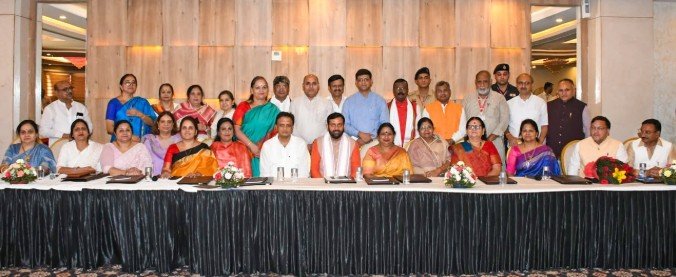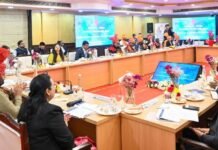At the 115th meeting of the All India Mayor’s Council Executive Committee in Panchkula, Haryana Chief Minister Naib Singh Saini delivered a compelling address underscoring the pivotal role mayors play in shaping India’s urban future. Describing mayors as not just ceremonial heads but active architects of city development, Saini said they are crucial links between government policies and the aspirations of ordinary citizens. Their executive powers, he noted, make them the backbone of local self-governance and essential drivers of on-ground transformation.
Speaking to an assembly of mayors and urban leaders from across India, the Chief Minister emphasized that cities must now be seen as engines of economic growth, hubs of innovation, and melting pots of culture. He proudly highlighted that Haryana is among the few states where mayors are directly elected by the people, a system that enhances transparency and accountability while deepening democratic participation. As India moves forward under the leadership of Prime Minister Narendra Modi towards the ambitious goal of becoming a developed nation by 2047, the urban landscape, Saini said, must become the foundation of that journey.
Taking a future-facing view, Saini asserted that Haryana treats urbanization not as a challenge but an opportunity. With projections indicating that over 900 million Indians will reside in urban areas by 2047, the government is investing in smart, sustainable, and citizen-friendly infrastructure. The aim, he explained, is to develop cities that blend ‘Ease of Living’ with ‘Ease of Doing Business’, thereby creating ecosystems that are not only economically dynamic but also environmentally conscious and socially inclusive.
Highlighting the state’s investment in urban development, Saini shared that Haryana’s allocation to urban local bodies has surged from ₹1,693 crore in 2014-15 to ₹5,666 crore in 2025-26. Smart city initiatives in Faridabad and Karnal, with projects worth ₹930 crore and ₹927 crore respectively, exemplify this urban renewal mission. The regularization of over 2,100 unauthorised colonies and infrastructure investment of over ₹1,000 crore in new authorized colonies signal a significant push towards planned urbanization.
The Chief Minister also highlighted major gains under national flagship schemes. Under the AMRUT mission, the state has already spent ₹2,930 crore. On urban transport, the rollout of electric buses has begun, with plans to procure 450 e-buses by 2026 under the PM e-bus initiative. In housing, over 21,000 houses have been delivered under the PM Awas Yojana (Urban), and more than 11,000 are currently under construction. The state’s own Mukhyamantri Urban Housing Scheme has allotted plots to over 15,000 families in 14 towns.
Saini also detailed Haryana’s achievements in solid waste management, emphasizing door-to-door waste collection, community composting, and the installation of biogas plants as integral components of the state’s urban sanitation model. These initiatives, he said, are now digitally integrated for better public accessibility and service delivery.
In a spirited call to action, Saini urged all mayors to go beyond conventional roles and turn their cities into brands with distinct identities. “This council meeting should serve as a milestone, not just for policy dialogue but for bold new commitments,” he stated. “Let every mayor here become the catalyst for transformation in their cities.”
Paying tribute to Prime Minister Modi’s leadership, Saini recounted how India’s global economic ranking has surged from the 11th position in 2014 to the 4th largest economy by 2025, with the vision to reach the 3rd spot by 2029. He said this progress, matched with reforms like direct mayoral elections, reflects the government’s commitment to grassroots empowerment and the spirit of Antyodaya, ensuring that the benefits of development reach the last citizen.
He also encouraged mayors to study successful urban models such as Indore’s, which has set benchmarks in cleanliness and civic innovation. “We must learn, adapt, and implement best practices to make Haryana’s cities models of modern urban governance,” he said, urging the adoption of transformative approaches in areas like sanitation, housing, and digital service delivery.
The event saw participation from a host of dignitaries including Rajya Sabha MP Kartikeya Sharma, Kalka MLA Shakti Rani Sharma, All India Mayor Council President Madhuri Atul Patel, Organizing General Secretary Uma Shankar, Senior Vice President and Karnal Mayor Renu Bala Gupta, Panchkula Mayor Kulbhushan Goyal, and mayors from several Indian states.
With Haryana positioning itself as a leader in empowering city administrations and preparing for the next phase of India’s urban evolution, Chief Minister Naib Singh Saini’s address marked a defining moment in the discourse on strengthening local governance and realizing the nation’s developmental aspirations.
#NaibSinghSaini #UrbanIndia #HaryanaDevelopment #SmartCities #MayorsCouncil #CityBranding #IndianUrbanReform #PMModiLeadership #EaseOfLiving
This is an auto web-generated news web story.





